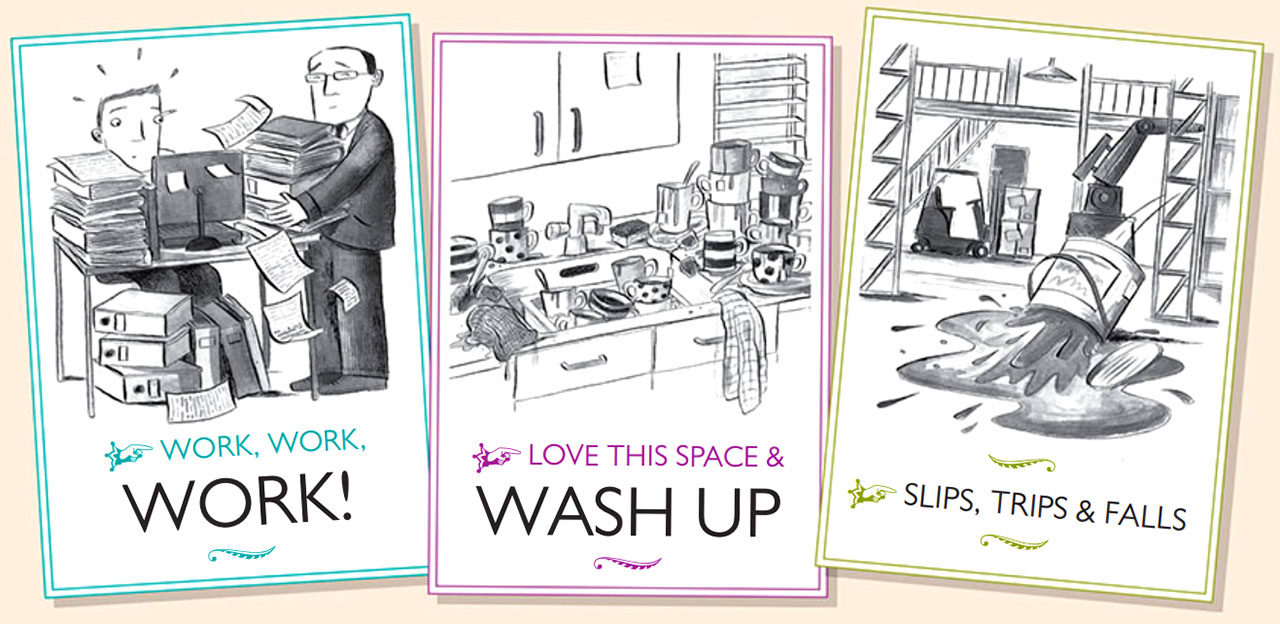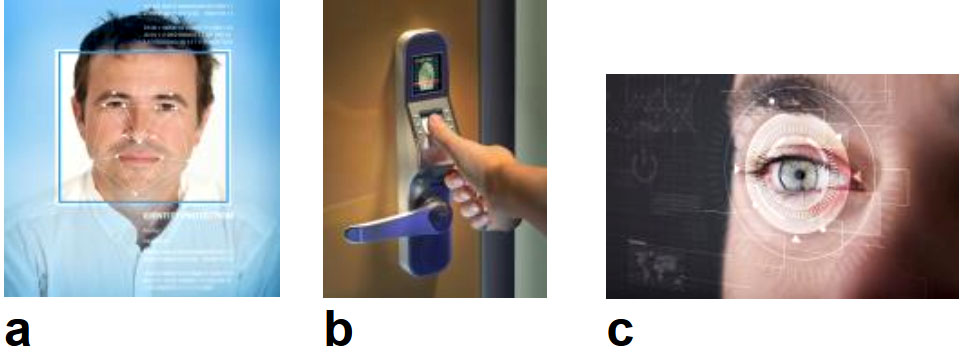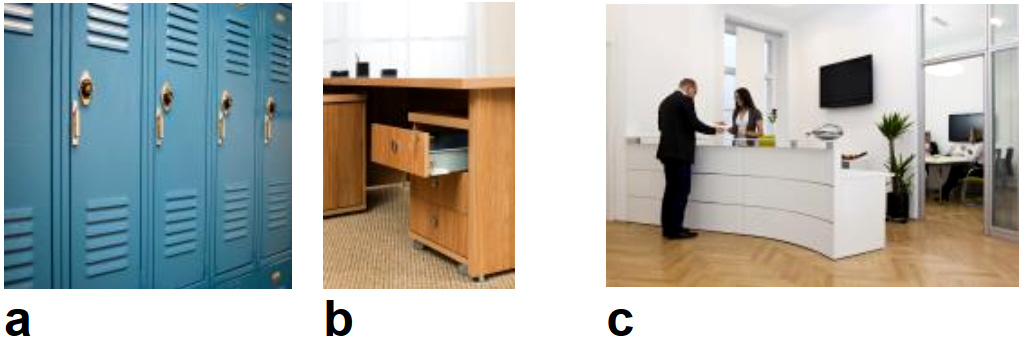Exercise 1
A. Listen to three people talking about security measures in the workplace. Which speaker has the most security measures at work? Which one has the least?
1 Jenn 2 Paul 3 Aisha
B. Listen to the three speakers again and choose the correct option.
1 Jenn says that the guests use their room key card to
a get in and out of the hotel lifts.
b go up and down in the lift.
c get access to the stairs.
2 She mentions that guests sometimes complain because
a the system to operate the lifts is complicated.
b they have problems opening their room doors.
c they have restricted access to other floors.
3 Paul feels that the receptionist
a can’t control access very well.
b is not responsible for answering the phones.
c does not have enough work to keep her busy
4 He says that
a staff and students don’t take precautions.
b the security cameras are not very useful.
c there have been some problems with crime.
5 Aisha feels that the office regulations
a were stricter in the past.
b have become much stricter.
c haven’t changed much over the years.
6 Which use of her ID badge doesn’t she mention?
a recording her work time
b getting through doors
c operating office equipment
Answer & Audioscript
A
Paul, who works in a university, seems to have the lowest level of security and Aisha, who works in an IT company, has the most security.
B
1 b 2 c 3 a 4 c 5 b 6 a
Audioscript
Jenn
Security is a big issue in the hospitality business although it can be very different depending on the hotel category. I mean, some low-cost hotels these days don’t even have an in-room safe for people to keep their valuables in, and I think that’s crazy. I work in a five-star hotel and guests need to use their room key card in the lifts to get to their floor. You just touch your room key card to the pad and the lift automatically selects your floor. You also need the room key card to get from your floor back down to the lobby. I think it’s becoming quite standard in newer city hotels. Not everyone likes it. Some guests complain it’s annoying when they want to visit another floor. Of course, you don’t have to take the lift. You can get access to other floors by the stairs, but it’s like setting your house alarm or locking your doors. It’s not going to make it completely impossible for someone to commit a crime, but it’s an extra barrier.
Paul
You know I’ve never thought about it before, but security is very relaxed in the university building where I work. Students and staff are walking in and out all day long and anyone can just walk in off the street. There’s only ever one receptionist on duty and she has to answer the phones, deal with queries and work on the computer, so she can’t possibly keep an eye on everyone who comes and goes. And whenever she needs to go somewhere or take a break, the reception area is completely unattended. There are signs on the walls in all the classrooms warning students to keep their valuables with them, and lecturers have to remember to lock the staff room door, but it’s not ideal and we occasionally have had problems with theft and vandalism. There aren’t even CCTV cameras in the corridors.
Aisha
I’ve worked in a multinational IT company for almost ten years now. We need to leave our mobile phones with the guard on reception and he puts them into a locker and you mustn’t bring in any pen drives or any type of USB storage devices to the office. In the past you didn’t need to wear your photo ID, but now your badge must be visible on you at all times. If a manager or the security guard catches you without it, they’ll say something. And you need it for everything. You see, it has a chip with radio frequency identification which you have to use for checking into and out of the building, and it opens doors based on your access to certain areas. And you have to use it to print or scan anything as well.
Exercise 2
A. Tony and Alex are discussing a problem at work. Listen to Part 1. Which situation below is the cause of the conflict?

B. Correct the false statements. Then listen again and check.
1 The ZX390 is faulty.
2 Tony’s apprentices are responsible for cleaning the workshop.
3 The cleaner is currently on holiday.
4 Tony and Alex are worried about completing the Japanese order on time.
5 Alex understands Tony’s concerns and those of the management team.
Answer & Audioscript
A
picture 3 – a spillage on a factory floor
B
1 T
2 F – Tony’s apprentices are not responsible for cleaning.
3 F – The cleaner only works in the evenings.
4 T 5 T
Audioscript
Part 1
A = Alex T = Tony
A: I’ve told you several times already about the cleaning problem on the factory floor, Tony.
T: Yes, you have, and I’ve told you – several times – that the ZX390 needs repairing. We had another leak yesterday. As far as I’m concerned, I’ve followed procedure. I reported the fault on the machine. It’s over to you now.
A: I appreciate it’s difficult for you, Tony, and thank you for telling us about the leak. However, it’s important that your apprentices clean up as they work. The management team are worried this is a real hazard.
T: It is a hazard. But I’m sorry, this is not my responsibility. My apprentices don’t have the time to clean. And what happens if someone slips and falls? We need a full-time cleaner. He only comes in the evening and that’s often too late.
A: Tony, as you know we’re a small business. We just can’t afford a full-time cleaner.
T: I understand what you’re saying, Alex, but what’s the solution? We need to repair the ZX390. I reported the problem ten days ago.
A: Yes, but to repair the 390 we will have to stop production. This is impossible – we need to meet our deadline for the Japanese order.
T: I know that, but it’s also important that we fix it as quickly as possible.
A: I totally agree. I can see it from both sides.
C. Listen to Part 2 and answer the questions.
1 What practical solution does Alex suggest to help resolve the problem?
2 How does Tony react to the suggestion?
3 Are Alex and Tony able to resolve the conflict?
4 What three things does Alex say will happen next?
Answer & Audioscript
1 The company will provide slip-resistant shoes for the apprentices.
2 He agrees but is still concerned about repairing the machine.
3 yes
4 She will speak to the management team, suggests that she and Tony review the issue at the end of the week, and will send an email to summarise their decision.
Audioscript
Part 2
T = Tony A = Alex
T: So how do we proceed?
A: I think we need to come to a compromise so that we can complete the Japanese order.
T: OK. So, what’s your solution?
A: Well, my suggestion is to supply your team with slip-resistant footwear. That will help prevent accidents.
T: Uh-huh, sounds like a good idea. But what about repairing the machine?
A: Well, as we both agreed, we will lose time if we stop production. So, let’s complete this order first and I’ll request an engineer to x the leak. Can I just check you’re happy with this idea before I speak to the management team?
T: Yes, that’s ne with me.
A: And then let’s review this situation at the end of the week.
T: Sure, why not?
A: Great. I’ll put that in an email, just to summarise what we’ve agreed.
Exercise 3
A. Listen to part of an interview with an expert talking about risk assessment in offices. Complete the notes.
Risk assessment notes
1 (1)…………….. any hazards such as:
• trailing wires
• damaged (2)……………..
• machines without guards
• (3)…………….. and temperature of workspace
• (4)…………….. must be adequate
• office chairs – (5)…………….. results in sick leave
2 (6)…………….. risks
3 Create procedures to limit risk
Answer & Audioscript
1 Identify 2 carpet 3 noise 4 lighting
5 backache 6 Evaluate
Audioscript
M = Man W = Woman
M: Why do you have to do risk assessment for offices?
W: We do it to make sure that the work environment is safe for the employees and any visitors. In fact, in most countries you have to do it – it’s the law.
M: So how does it work?
W: Firstly, you have to identify any significant hazards in the office and also who is at risk: employees, visitors, cleaners, etc.
M: What kind of things can be dangerous?
W: Well, things like wires and cords that trail across the floor, and carpet that doesn’t fit properly or is torn, both of which could trip people up. Erm, dangerous machines that don’t have guards on them, for example. You don’t want to have any accidents.
M: Is that all you’re looking at?
W: Oh, not at all. Then there are things like the heat or the noise in the workspace. Is it too hot or too cold or noisy for people to work safely and comfortably?
M: I hadn’t thought of that. But I suppose if you’re too hot or cold, you can’t work effectively because it can make you feel ill.
W: Exactly.
M: Would you also look at things like lighting?
W: Yes, you can’t expect people to work in places where there’s inadequate lighting because it could damage their eyesight.
M: What about office furniture? Is it important to have good chairs for example?
W: Oh, absolutely. One of the most common causes of staff being off sick is backache, so it’s a good idea to ensure that the seating is good for their posture.
M: So, once we’ve identified these risks, what happens next?
W: Then you need to evaluate the risks involved and put procedures in place to limit the risks and …
Test
1. Listen to the speaker and choose the correct response a, b or c.
1 a b c
2 a b c
3 a b c
4 a b c
5 a b c
Answer & Audioscript
1 b 2 b 3 c 4 a 5 c
Audioscript
1 How should we proceed?
a I agree, but I can see it from both sides.
b I think we need to come to a compromise.
c I know how you feel.
2 Why don’t we try asking customers what they want?
a My suggestion is to ask customers.
b Sorry, I’m not happy with this idea.
c What do you suggest?
3 Can we come to an agreement on this?
a I know this is difficult.
b I know how you feel.
c Sure, why not?
4 Can I just check that you’re happy with this?
a Yes. I agree with everything.
b My suggestion is to be happy.
c I understand what you’re saying.
5 How would you deal with the situation?
a I appreciate your hard work.
b I can see it from both sides.
c My suggestion is to employ more staff.
2. You will hear eight short recordings twice. For questions 1-8 choose the correct answer.
1 What shape is the footwear sign?
a square
b circle
c triangle
2 What kind of company is GSid?
a waste management
b clothing producer
c investment
3 Which system does the man want to buy?

4 Why is the woman meeting a supplier?
a The supplier hasn’t followed specifications.
b She is looking for a new supplier.
c The supplier has failed to deliver on time.
5 Where must staff leave their mobile phones?

6 What do they decide to do about the factory cleaning?
a Find another company.
b Ask a friend to help with the cleaning.
c Give the current company a warning.
7 What annoys the team members?

8 What caused the accident?
a not enough signs
b something left on the floor
c no side guards on machines
Answer & Audioscript
1 b 2 b 3 a 4 a 5 c 6 c 7 b 8 b
Audioscript
1 What shape is the footwear sign?
A: Didn’t you see the sign when you came into the factory?
B: Which sign? The square red one with the fire extinguisher?
A: No, the one about footwear. You can’t come in here with sandals on.
B: Oh, sorry, I didn’t see that. I did see a yellow triangular sign as well.
A: Really? Come here. See the blue circle with the picture of a boot?
B: Yes. Sorry, I missed it when I came in.
2 What kind of company is GSid?
Welcome to GSid headquarters. We’ve just invested in a new security system so you’ll all need to sign in and get a badge. You might think it’s a bit excessive for a company that makes protective clothing for people working in waste management. But we’re developing new materials which will make working in waste management much safer. So we don’t want any competitors analysing them just yet.
3 Which system does the man want to buy?
A: I’ve been looking at different security systems.
B: I hope you’re not thinking of buying one that uses fingerprints?
A: Why not? That was one option I was looking at.
B: Because I’ve read how easy it is for criminals to copy fingerprints from just a photo.
A: Oh, I didn’t know that. Well, there’s iris recognition – it reads your eye. That’s another option.
B: Not sure. What about facial recognition instead? Personally, I’d prefer that.
4 Why is the woman meeting a supplier?
I’ve got a meeting with the supplier and I really need to be prepared. They’re being very difficult and although their deliveries are on time, they are compromising on quality. The main thing is, they won’t follow our specifications properly. If they can’t do that, we’ll have to think about finding another supplier. It was my decision to use this supplier, so it won’t look good for me if they fail.
5 Where must staff leave their mobile phones?
Now, as you know, we’ve decided to ban the use of personal mobile phones in the factory. I know this isn’t a popular decision, but we’ve decided you can’t leave it in your desk drawer or work locker, where you keep your clothes. When you arrive each morning, you need to hand them over to the receptionist who will keep them safe for you while you’re here.
6 What do they decide to do about the factory cleaning?
A: The cleaning company isn’t doing a good job in the factory.
B: Do you want me to find new cleaners? I’ve got a friend who runs a cleaning company and they’re very reasonable. He’d do a really good job.
A: First we need to explain what’s wrong to the current company and give them a chance to improve.
B: Okay, and then we can review the situation after that.
7 What annoys the team members?
A: I don’t mind people eating at work if they do it in the staff room.
B: We don’t eat at our desks.
A: Some people do.
B: What annoys the team most is this old equipment. The computers might still work but they’re so old now.
A: You’re right. They take so long to load. But it would be expensive to change them.
B: True but we should try to get the company to change them.
8 What caused the accident?
A: We’ve just had an accident in the factory. Despite having signs everywhere, someone has ignored the ones about keeping the floor tidy.
B: What happened?
A: A worker tripped over a spare side guard, which someone left on the floor, and injured themselves.
B: Perhaps someone dropped the side guard while they were checking the machine.
A: It’s possible, but everyone needs to make sure the floor is kept clear.
3. Listen to a man and woman discussing safety and security in their company. Choose the correct answer a, b or c.
1 Why was the meeting called?
a Safety and security has not been good.
b Three people had to go to hospital.
c Minor accidents are happening every week.
2 What could the reason be for the accidents?
a Workers are not aware of the rules.
b Staff sometimes forgot to wear protective clothing.
c Supervisors are not checking employees.
3 What does the woman say about training?
a Everyone does one training course per year.
b There are too many rules to remember.
c People forget to do the training.
4 What is the woman’s suggestion?
a Review training at the start of every shift.
b Have a weekly check to go over rules.
c Do much more training every year.
5 What does the woman say about safety?
a Staff do not trust the company to keep them safe.
b The company must do more to protect staff.
c Staff must take responsibility for their own safety.
6 What is security like in the factory currently?
a There are video cameras working 24/7.
b It needs improving.
c Tools are stolen every night.
7 How do they decide to stop people stealing the tools?
a by turning cameras on during the day
b by installing more cameras
c by installing more security locks
Answer & Audioscript
1 a 2 b 3 a 4 b 5 c 6 b 7 c
Audioscript
Listen to a man and woman discussing safety and security in their company.
A: I’d like to discuss the safety and security problems we’ve had over the last month. There have been too many things going wrong. We must improve the situation.
B: Absolutely. We’ve had three minor accidents and another one where the person had to go to hospital.
A: That’s unacceptable. Why has the number of accidents increased?
B: I think staff aren’t following the rules and sometimes they don’t wear the full protective clothing. One of the accidents was more serious because the man wasn’t wearing his cut-resistant gloves.
A: Doesn’t the supervisor check that everyone is wearing the appropriate clothes?
B: Well, yes, he did check, but the worker took his glove off afterwards to do something else and forgot to put them back on.
A: Do you think staff need more training?
B: I think they need to be reminded about the rules more often. Everyone has to do a safety course once a year, but they’ve become lazy or forgetful.
A: So what do you suggest?
B: We could remind them every week. The supervisors can go through a quick checklist with them at the start of each week.
A: What about increasing the number of courses each year? Or we could just have a quick check at the beginning of each shift?
B: That’s too much.
A: Why?
B: They’ll think we don’t trust them to look after themselves.
A: But if it prevents accidents …
B: I know what you’re saying, but we need to show staff that they’re responsible for their own safety. We can’t do everything for them.
A: Yes, you’re right. Now the next thing we need to look at is security. We’ve had several tools stolen from the factory.
B: What about the video cameras? I thought they were on day and night.
A: We only put them on at night. Do you think it could be employees who are stealing the tools?
B: I hope not. However, we need to have the cameras on all the time. But it might not be employees. The security doors are left wide open sometimes during the day. Anyone could walk in and take anything.
A: So we need to have different security locks that can only be opened by managers or supervisors, then?
B: Yes, I think that would be a great idea.
Related Posts
- Practice Listening Business English Exercises for B1 – Leadership
- Practice Listening Business English Exercises for B1 – Working abroad
- Practice Listening Business English Exercises for B1 – Entrepreneurs
- Practice Listening Business English Exercises for B1 – Logistics
- Practice Listening Business English Exercises for B1 – Business strategy
- Practice Listening Business English Exercises for B1 – Job hunting
